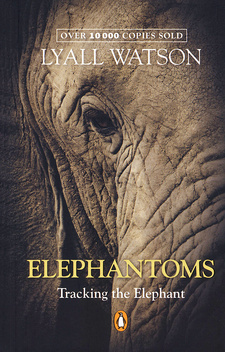Elephantoms, by Lyall Watson

Elephantoms, by Lyall Watson. The Penguin Group (SA). Cape Town, South Africa 2004. ISBN 9780143024538 / ISBN 978-0-14-302453-8
Part meditation on an elusive animal, part evocation of the power of place, Lyall Watson's memoir 'Elephantoms: Tracking the elephant' presents an alluring mix of the mysteries of nature and the wonders of childhood.
Seeing the Elephant
To see the elephant. (US slang): to get experience of life, to gain knowledge of the world. (Oxford English Dictionary)
Africa is the stable heart of old Gondwana, left exposed when other less constant continents drifted away 130 million years ago. Today it straddles the equator, a vast plateau of ancient rock rising steeply from a narrow coastal strip that remains almost unbroken. There are very few inlets, bays, or gulfs on a coastline shorter than that of Europe. In the south, a semicircle of misty cliffs plunge vertically eight hundred feet down into deep water that rises silently and suddenly at the rocks, sweeping the unwary away in a relentless undertow. This is the Cape. The Cape of Storms, washed from the east by the warm flood of the Agulhas Current, bringing coral fish down to the edge of the Roaring Forties; and from the west by an enormous cold current - the Antarctic Drift - carrying penguins and fur seals up into the tropics. There is no other country whose coasts face so great a stretch of completely open water. And none which divides two great seas of such different character, blurring the boundary between Atlantic and Indian Oceans, creating a unique climatic zone with its own idiosyncratic weather and its own peculiar flora, both of which have played a vital part in animal and human evolution. The Cape Floral Kingdom, one of just six major floral divisions in the world, is known as fynbos and consists of more than 8 500 species, over 70 per cent of which are found nowhere else on earth. It is a rough-edged, hard-leafed evergreen community of heaths, sedges, reedlike restios, delicate gladioli, proteas, aromatic citruses, and pelargoniums - all crowded into a rich palette of saturated colours that can involve as many as 120 different kinds of plants in an area the size of a billiard table. The composition varies wildly from one slope to another, forging delicate partnerships and stretching out for six hundred miles along the coastal plain between the ocean and a range of mountains guarding the interior. These run roughly parallel to the shore and are older even than the geological disturbance which isolated Africa. They folded inwards and upwards 250 million years ago during the growing pains of Gondwana, crumpling as the great land mass adjusted to tectonic stress along a fault line that finally separated Africa from South America. Ancient sedimentary deposits in the area stand now in disarray, some frozen in vertical throws ten thousand feet high, broken only by narrow poorts or gaps that allow inland rivers to escape to the sea. The seaward slopes are fresh, ragged, and beautiful, weathering from grey to gold and rose as the declining sun warms their peaks. On the coastal plains at their feet, the rivers have cut deep gorges, the mouths of which are mostly drowned by rising sea levels and then partly filled in by beds of marine fossils or chains of lakes. All adding up to an exclusive ecosystem covering perhaps thirty thousand square miles of rolling ground beneath the steep walls of the Langeberg range, which run out eastwards until they fall into the sea. All this happened long before there were elephants. Proboscidean evolution began in Africa roughly sixty million years ago, probably with a small creature about the size of a pig, which wallowed in swampy depressions along the Valley of the Nile. [...]
This is an excerpt from the memoir 'Elephantoms', by Lyall Watson.
Title: Elephantoms
Author: Lyall Watson
Genre: Novel
Publisher: The Penguin Group (SA)
Cape Town, South Africa 2004
ISBN 9780143024538 / ISBN 978-0-14-302453-8
Softcover, 13 x 20 cm, 253 pages
Watson, Lyall im Namibiana-Buchangebot
Elephantoms: Tracking the elephant
Part meditation on an elusive animal, part evocation of the power of place, 'Elephantoms: Tracking the elephant' presents an alluring mix of the mysteries of nature and the wonders of childhood.
